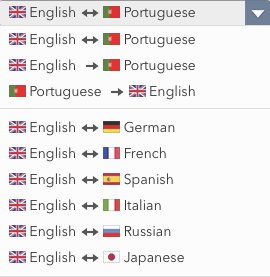Exactly How English To Portuguese Translation Bridges Language Barriers
Exactly How English To Portuguese Translation Bridges Language Barriers
Blog Article
Leading Tips for Perfect English to Portuguese Translation Services
Attaining extraordinary English to Portuguese translation needs even more than mere word-for-word conversion; it demands an understanding of social nuances and linguistic complexities. Choosing qualified translators who are both culturally mindful and fluent is critical. Similarly crucial is the method of localization, which includes customizing web content to regional variations. Additionally, employing contextual references guarantees that the original tone and significance are maintained. The journey does not finish there; an extensive evaluation and modifying process is vital. What other crucial aspects should be taken into consideration to boost translation top quality additionally?
Understand Cultural Nuances
When translating from English to Portuguese, grasping the social nuances is essential for generating a precise and powerful message. The Portuguese-speaking world varies, encompassing numerous regions, each with its unique customs, expressions, and social standards. A translator needs to be attuned to these nuances to make sure that the translation not only communicates the intended message yet also reverberates with the target audience.
As an example, colloquial expressions in English might not have direct equivalents in Portuguese. A phrase that functions well in one society might result in complication or misinterpretation in an additional. Comprehending local dialects and variations, such as those discovered in Brazil and Portugal, is important; words might hold different connotations or uses depending on the locale.
Furthermore, social context plays a significant role in translation. Consideration of historic, social, and political elements can affect language selections and tone. This cultural understanding permits for the adaptation of web content that straightens with local values and assumptions, therefore enhancing the effectiveness of communication. Eventually, an extensive understanding of social subtleties is important for providing translations that are not just linguistically precise however also culturally appropriate and engaging.
Select Certified Translators
Choosing certified translators is a crucial action in ensuring the precision and top quality of English to Portuguese translations. A translator's competence not only encompasses language efficiency but also a deep understanding of social context, idiomatic expressions, and industry-specific terminology. When choosing a translator, focus on those with formal training in translation studies or linguistics, as well as appropriate qualifications that show their expert skills.
Experience plays a critical role as well; translators concentrating on details fields-- such as legal, clinical, or technological-- are most likely to supply specific translations customized to the industry's criteria (English To Portuguese Translation). Additionally, consider their portfolio and customer reviews to assess their previous job high quality and integrity
Engage translators who are native Portuguese speakers, as they have a natural understanding of the language's nuances and regional dialects. This experience boosts the translation's authenticity and effectiveness.
Usage Contextual Recommendations

When equating, it is essential to acknowledge colloquial expressions and social recommendations that might not have direct matchings in Portuguese. For example, specific phrases that resonate in English might call for adaptation to communicate the very same psychological weight or social relevance in Portuguese. Utilizing contextual referrals can assist translators choose the ideal terms and design, thus improving the total quality and influence of the translation.

Emphasis on Localization
Localization plays an essential role in the translation process from English to Portuguese, as it ensures that the converted web content is culturally ideal and pertinent to the target market. English To Portuguese Translation. This process exceeds plain translation; it entails adjusting the material to the cultural, social, and linguistic subtleties details to Portuguese-speaking areas
Comprehending neighborhood idioms, customizeds, and preferences is vital. As an example, specific phrases or recommendations that resonate with an English-speaking target market might not have the same influence on Portuguese audio speakers. It is necessary to think about regional variants, such as Brazilian Portuguese versus European Portuguese, as each has unique vocabulary and stylistic differences.
Furthermore, localization encompasses formatting, such as day and time formats, money, and dimension units, which can vary dramatically across societies. This focus to detail promotes a link with the audience, boosting interaction and comprehension.
Moreover, employing local dialects and vernacular can offer authenticity, making the material extra relatable. By concentrating on localization in English to Portuguese translation, services can efficiently interact their message, construct trust with their audience, and eventually accomplish their desired goals.
Testimonial and Edit Thoroughly
Thorough testimonial and editing are important action in the translation procedure, particularly when converting English material into Portuguese. This phase makes sure that the converted material not only keeps the original significance yet additionally reverberates well with the target market. Given the cultural and etymological subtleties, a website link thorough approach to evaluate and editing and enhancing is vital.
Begin by comparing the initial English text with the Portuguese translation, paying close interest to context, tone, and terms. It's vital to make certain that colloquial expressions and social referrals are appropriately adjusted for the Portuguese audience. Involving a 2nd translator or a native speaker for this review procedure can supply invaluable insights and capture mistakes that may have been overlooked.
Additionally, look for grammatical accuracy and stylistic consistency throughout the document. Usual difficulties such as false cognates or ambiguous expressions should be resolved to prevent false impression.
Final Thought
Achieving outstanding English to Portuguese translation services necessitates a comprehensive strategy that includes understanding social nuances, choosing qualified translators, making use of contextual recommendations, prioritizing localization, and carrying out comprehensive testimonials and edits. Each component plays a critical function in ensuring that translations are not just accurate yet likewise reverberate with the target market. By executing these approaches, organizations can improve the effectiveness of their communication from this source and cultivate a much deeper link with Portuguese-speaking audiences.
Attaining extraordinary English to Portuguese translation requires more than plain word-for-word conversion; it demands an understanding of social nuances and linguistic ins and outs.Selecting certified translators is a critical step in making certain the accuracy and high quality of English to Portuguese translations.Extensive review and modifying are important steps in the translation process, especially when transforming English content right into Portuguese.Begin by contrasting the original English text with the Portuguese translation, paying close attention to terminology, tone, and context.Attaining phenomenal English to Portuguese translation solutions necessitates an extensive technique that incorporates understanding social subtleties, picking certified translators, making use of contextual references, prioritizing localization, and conducting extensive testimonials and edits.
Report this page